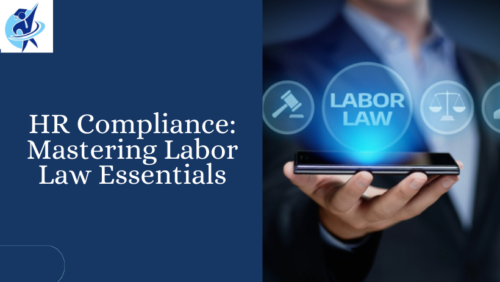Key Components of Labor Law Compliance
1. Employee Classification: Properly classifying employees is crucial. Misclassification can lead to significant legal and financial repercussions. HR must distinguish between full-time, part-time, temporary, and independent contractors, ensuring each category receives the appropriate benefits and protections.
2. Wage and Hour Laws: Compliance with wage and hour regulations, such as the Fair Labor Standards Act (FLSA), is essential. This includes adhering to minimum wage standards, overtime pay, recordkeeping, and child labor laws. HR must regularly review and update payroll practices to align with current laws.
3. Anti-Discrimination Laws: HR departments must enforce policies that prevent workplace discrimination based on race, color, religion, sex, national origin, age, disability, or genetic information. This involves regular training, monitoring, and addressing complaints promptly and effectively.
4. Workplace Safety: Ensuring compliance with the Occupational Safety and Health Administration (OSHA) standards is a key HR responsibility. This includes conducting regular safety training, maintaining records of workplace injuries and illnesses, and fostering a culture of safety.
5. Family and Medical Leave: HR must manage compliance with the Family and Medical Leave Act (FMLA), which allows eligible employees to take unpaid, job-protected leave for specified family and medical reasons. Accurate tracking and documentation are essential.
6. Employee Benefits: Offering compliant employee benefits packages, including health insurance, retirement plans, and other perks, is critical. HR must stay updated on regulations such as the Employee Retirement Income Security Act (ERISA) and the Affordable Care Act (ACA).
Best Practices for Maintaining Compliance
1. Regular Training and Education: Continuous education on labor laws for HR staff and employees helps in maintaining compliance. Regular workshops, seminars, and online courses can keep everyone informed about the latest regulations and practices.
2. Policy Development and Review: Developing clear, comprehensive workplace policies and regularly reviewing them ensures they are up-to-date with current laws. This includes employee handbooks, code of conduct, and specific procedures for handling complaints and violations.
3. Documentation and Recordkeeping: Maintaining accurate and detailed records is vital for compliance. This includes employee files, payroll records, benefits enrollment, and any incidents or complaints. Proper documentation can protect the organization during audits or legal disputes.
4. Internal Audits and Assessments: Conducting regular internal audits helps identify potential compliance issues before they escalate. Assessing policies, procedures, and practices ensures they meet legal requirements and helps in making necessary adjustments proactively.
5. Legal Consultation: Engaging with labor law attorneys or legal consultants can provide valuable insights and guidance. They can help interpret complex regulations, review policies, and represent the organization in legal matters.
Addressing Compliance Challenges
1. Adapting to Legal Changes: Labor laws are subject to change, and HR must be agile in adapting to new regulations. This involves staying informed through reliable sources, attending relevant conferences, and participating in industry networks.
2. Handling Employee Complaints: Developing a robust system for addressing employee complaints related to labor law violations is crucial. This includes clear reporting channels, impartial investigations, and timely resolution of issues.
3. Managing Remote Workforce: With the rise of remote work, ensuring compliance for remote employees presents unique challenges. HR must address issues such as remote work policies, wage and hour compliance, and workplace safety for home offices.
4. Ensuring Diversity and Inclusion: Promoting diversity and inclusion not only enhances workplace culture but also helps in complying with anti-discrimination laws. HR should implement and support initiatives that foster an inclusive work environment.
By mastering these labor law essentials, HR can effectively mitigate risks, enhance employee relations, and contribute to the overall success of the organization.
“Achieve HR success with Next Innovation Asia, Chennai’s premier HR Training Institute. Gain skills, certification, and job support. Join us!”

